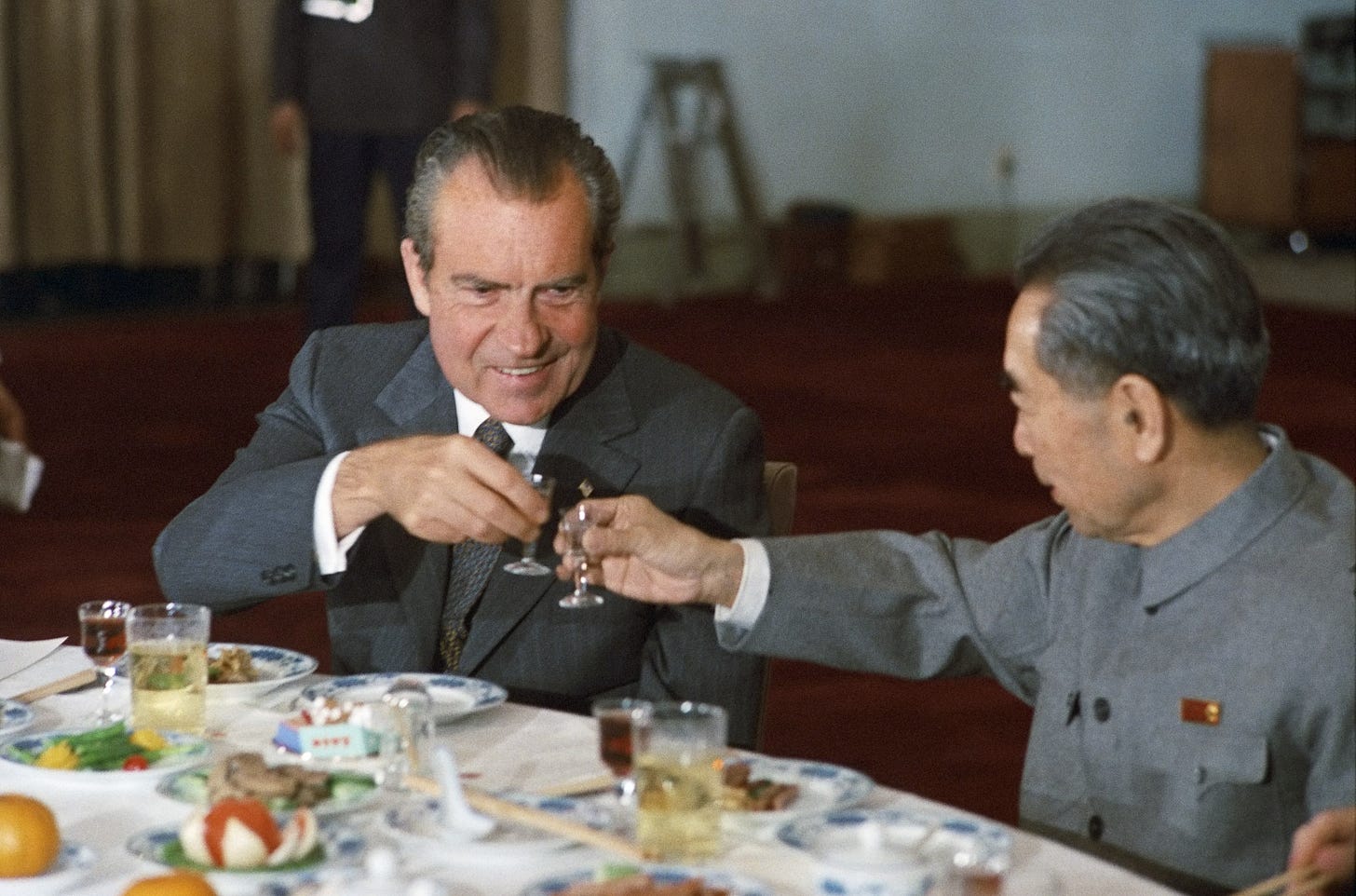I will start this essay with a story I heard a few days ago. This is the kind of story that I hear or participate in on a daily basis. I want to tell this story not because it is special, but because it is the opposite of being special. It happens far too often. And under this story lies an absolute key you need in order to understand China.
So Ms. A is my friend, a banker who recently advised a Western firm in acquiring a Chinese target company. Naturally, during the due diligence process, the bankers and lawyers uncover a few problems about the target company. Ms. A was going through these problems with the Western firm. One of the issues concerned unpaid social security expenses.
Chinese companies have a very high social security obligation. Although the apparent personal income taxes don’t look high, combined with social security expenses, the “real” tax level can be higher than the levels of European developed economies. If fully paid, only half of the employee compensation can actually go to the employees, with the other half going into taxes and public social security funds.
The state-owned enterprises and listed companies are mostly compliant in this area, but most of the unlisted medium-, small- and mini-sized enterprises are not. The government knows about it but usually doesn’t enforce the rules, fearing that full compliance will crush those small enterprises. So naturally, when one of these firms goes on sale, social security non-compliance issues almost always appear in the list of concerns.
Representatives of the Western firm asked Ms. A what this was. Ms. A was at a loss how to respond. To be sure, this is illegal. But it’s also not so serious because everyone does it, and the government knows everyone does it. She didn’t want to derail the transaction, yet she also had professional ethics to uphold, so she couldn’t lie either. Ohh…ahh…you know…you know…you know… She was very tortured in her explanation. The Western firm people were very confused and asked a bombshell question:
“So, is this slave labor?”
What the?! Ms. A was totally shocked and spent the next whole hour scrambling to explain that, no, this is absolutely not slave labor. Whatsoever. Not at all. It’s not a good thing, but it’s very common. It’s no big deal and easily remediable.
I believe that Western company eventually let go of the issue, but I speculate they still didn’t fully get it.
In another recent conversation, a European friend asked me why there is so much “vagueness” in Chinese laws, driving a lot of Western firms uneasy, yet it seems most Chinese businesspeople are generally comfortable with this vagueness.
To really comprehend this, we need to recognize that there is something much deeper going on here, and it concerns a key feature of contemporary Chinese society.
It’s about China's “low-trust society.”
For this essay, I will first explain what I mean by this. I will explore why it’s the case and will give a few examples of how this applies to daily lives, including the “vagueness” above. For Part 2, I will discuss how this applies to business and investment decision-making in China. For Part 3, I will touch on how this societal feature determines the kind of political system and policy frameworks of modern China.
What is a “low-trust” society?
To be sure, “low trust” does not mean there is no trust in our society. No society can exist or survive without trust. Without trust, transactions can’t take place. Without trust, governments can’t govern. Without trust, people cannot live with each other.
“Low trust” means we have a generally lower level of trust among people than in some of these “high-trust” societies, like the West.
The defining difference lies in whether we trust strangers. Here, by “strangers,” I don’t just mean any random Joe on the street. The “strangers” could be one of your colleagues, one of our business counterparts, or even your neighbors. They could be any person who you don’t really know that well, anyone outside your immediate family, and anyone whom you don’t deem as your real friend.
In a low-trust society, people tend not to trust strangers.
Another story I saw somewhere: A girl went back to her village to spend the Spring Festival holiday with her grandma. One day, their neighbor’s hen laid some eggs in their backyard. The girl wanted to return the eggs to their neighbor. But her grandma stopped her. Just eat the eggs, Grandma admonished, what if our neighbor thought it was us who stole them?
To your Western ears, you might want to find this grandma to be too cynical. For me, although I won’t agree with her, I totally get why she responded in such a way. It's very likely that, many years ago, when this grandma was also an innocent girl, she did something out of goodwill, only to be met by hard lessons of trusting “strangers” too much. “人心叵测 People’s hearts are hard to fathom.”
When I do business with both Western and Chinese counterparts, I see a clear difference in how each of them perceive “trust.”
In the West, whenever you meet a new business partner, your assumption is that this person is to be trusted. You start with the assumption of a full “trust score”. If there is anything that undermines this trust, you subtract from that score. The partner keeps doing weird stuff? You subtract that score even more, until the moment when the partner lies straight to your face. Oh shoot, these guys are not trustworthy at all! You immediately cross them out and will never bother working with them.
In short, in the West, you are trustworthy until proven otherwise.
In China, the process works the other way around. Here, you are not trustworthy until proven otherwise. The starting assumption is that you should not be trusted. Your starting “trust score” is 0. And you build from there. Maybe something happens that shows that, hmm, you are a bit more trustworthy than assumed, so they add the scores. And after several tests and trials, your “trust score” reaches a point when your business partner finally admits that, hey, you are a trustworthy person after all!
In China’s “low-trust society,” building trust as a stranger needs effort.
China’s model makes me think of one recent interview on hiring and management philosophy by Brian Chesky, founder of Airbnb, when he talked about “every potential hire was guilty until proven innocent.” (video below, at 28:40 mark)
What Chesky means is that when most people interview potential hires, they work from the assumption that the candidate is good, and so they interview to find potential weaknesses. Chesky thinks this approach is dead wrong. Instead, you should assume the candidate is not good, and look for evidence to suggest the candidate may not be bad after all.
Chesky’s line of thinking is actually the same as how it works in China. The fact that Chesky brought this up as if it was some kind of counter-intuitive idea for his Western audience is quite telling for understanding the West-China differences here.
Why does China have a low-trust society?
I always like to ask about the “why”, but I know most people don’t care, so I will skim through this part quickly.
The first reason is obviously poverty or at least memories of poverty. When material resources are scarce, people tend to be impatient to get rich. Inevitably, some people will cut corners. Some will cheat. You don’t need everyone to be a cheater to break down trust. If only 1 out of 100 is a cheater and becomes successful because of cheating, cynicism will spread like wildfire, and very soon, you will not be able to trust people that much.
This is why being “low-trust” is not a hallmark of China alone but also applies to many developing countries. I imagine there exist a roughly positive correlation between material wealth and societal trust levels. Furthermore, as Chinese people become richer, I feel that younger generations operate in a higher trust mode than the previous generations.
Another reason may be that China has a “godless” society. In most of our minds, there is no place for God. We don’t live under the constant gaze of God or anything permanent. Since we don’t have a common faith in the permanent, self-interest is the only common denominator in conducting daily transactions. Everyone is purely for their own and/or the interests of their immediate nuclear families. It’s like the “dark forest” in Liu Cixin’s Three Body Problem. It would be naive to assume strangers are to be trusted in the dark forest.
What are other examples of “low trust”?
The “low-trust” nature permeates the society. The “neighbor’s eggs” story is just one of the numerous cases Chinese people encounter on a daily basis.
It’s also prevalent in business dealings, where the stakes are higher than daily lives.
Business-making in China is often like courtship. It’s rare for a deal to be made between two companies in their first meetings. There will be many follow-up meetings to gauge each other's actual intent and creditworthiness.
This is also why liquor occupies such an important role in China’s business culture. People certainly don’t drink baijiu for banquets just because it has attractive flavors or because it is fun. The drinking culture in China is not for fun. Instead, it is a lubricant, creating an occasion for your potential future business partners to let down their guard, and show their true colors.
You are being watched while you drink. It’s part of the job.
In a society where most people don’t have faith in the permanent and don't trust each other, you would imagine people will look more to the government authorities to provide fair administration of justice.
But Chinese people are also too smart to realize that there is nothing godly about those “government authorities” either. Walking and sitting in the corridors of power are, after all, only human beings. Because they are also human beings, they are bound to make mistakes, be biased, and have their self-interests. In the eyes of ordinary folks, every official is presumed to be corrupt unless proven innocent. It’s like what I wrote when commenting on the movie Ne Zha 2: deep down, Chinese people are too cynical towards the government people to trust them blindly.
A vivid example was the 2022 Shanghai lockdown. In the days running up to the lockdown, the local Shanghai government was still trying to pacify residents that everything was under control and that there would be no lockdown. But people knew how it would play out, so they scrambled for daily necessities across the city despite government warnings against hoarding.
But on the other hand, the government doesn’t trust its people either, and not that these people deserve trust in the first place. Again, Chinese people are “too smart,” and they can always find ways to game the system. To manage these restless people, it’s not enough just to make some ordinary laws, because the Chinese people will devise all kinds of ways to find loopholes and work around these laws.
Instead, the government has to make extremely harsh laws. In the Criminal Code of PRC, as many as 422 types of felonies are listed. Many crimes can lead to serious consequences. For instance, a government official taking a bribe of over 3 million yuan (~$450K) can already be punishable by death. Spreading 500 pornographic videos can potentially give you up to 10 years in jail.
And it’s not just about being harsh but also sufficiently vague. Catch-all offenses and vague spaces for arbitrary rulings are everywhere. An infamous catch-all offense is the “寻衅滋事罪 crime for creating troubles,” a felony that could theoretically cover something as mundane as quarreling in public but is punishable by a maximum of 10 years of jail time, too. There was a proposal to add a new crime about “hurting national feelings”, which was fortunately dropped amid intense criticisms.
It seems heavy efforts are made to ensure any type of offense, large or small, will have a legal basis for punishment waiting for you. But it’s certainly not possible for the government to enforce all these laws. And so comes a common saying for the three prominent features of China’s legal system:
严格立法 Legislate strictly and harshly
普遍违法 Non-compliant commonly
选择性执法 Enforce the laws only selectively
The story about social security non-compliance at the beginning of this article is but one example of these features. The government makes very strict rules about social security contributions because, without doing so, many businesses may simply ignore their obligations. But because the rules are too strict, it’s practically impossible for most businesses to fully comply without going bankrupt, so virtually everyone is non-compliant. The government knows about all of this but would rather keep the status quo most of the time and would only enforce the law very selectively. Businesses know that government knows about this, and knows the hammer may fall at any time, but can’t do anything about it other than trying to stay in the good graces of the authorities, praying and just getting comfortable about it.
Everything thus hangs in a delicate balance. Unfortunately, without a fundamental upgrade of societal trust level, you will not see an end to this dynamic anytime soon.
For Part 2, I will discuss the challenges and unique opportunities this “low-trust” society brings to doing business and making investments in China. For Part 3, I will discuss why this can fundamentally explain the particular kind of political system that China has today. Stay tuned!
Mar 31 update
Part 2 is here:
I also wrote an intermission post about some important caveats of my theory:
[The paywall below has no content inside. I put it here because of weird Substack algorithmic reasons that I don’t bother to elaborate]





